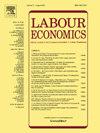Skill demand versus skill use: Comparing job posts with individual skill use on the job
IF 2.6
2区 经济学
Q2 ECONOMICS
引用次数: 0
Abstract
Skill requirements in a job post reflect an employer’s “wish list,” but do they also reflect skills used on the job by the hired worker? We compare skill measures derived from the text of online job posts with individual-level data from the Danish Labour Force Survey (LFS) in which participants report their main skills used on the job as free text. By identifying individual workers from the LFS who can be matched to a job post, we validate that the extensive margin skills measures derived from job postings data reflect main skills used on the job. Thus, using job postings data to analyze skill use on the job is generally a valid empirical strategy. However, we also show that heterogeneity in returns to skills is missed if only the extensive margin of skill demand is considered.
技能需求与技能使用:比较工作岗位与个人技能在工作中的使用
工作岗位上的技能要求反映了雇主的“愿望清单”,但它们也反映了被雇佣工人在工作中使用的技能吗?我们比较了从在线招聘职位文本中得出的技能指标与丹麦劳动力调查(LFS)的个人层面数据,其中参与者报告了他们在工作中使用的主要技能作为自由文本。通过从LFS中识别出可以与工作岗位相匹配的个体工人,我们验证了从工作岗位数据中得出的广泛边际技能措施反映了工作中使用的主要技能。因此,使用职位发布数据来分析工作中的技能使用通常是一种有效的经验策略。然而,我们也表明,如果只考虑技能需求的广泛边际,技能回报的异质性就会被忽略。
本文章由计算机程序翻译,如有差异,请以英文原文为准。
求助全文
约1分钟内获得全文
求助全文
来源期刊

Labour Economics
ECONOMICS-
CiteScore
3.60
自引率
8.30%
发文量
142
期刊介绍:
Labour Economics is devoted to publishing research in the field of labour economics both on the microeconomic and on the macroeconomic level, in a balanced mix of theory, empirical testing and policy applications. It gives due recognition to analysis and explanation of institutional arrangements of national labour markets and the impact of these institutions on labour market outcomes.
 求助内容:
求助内容: 应助结果提醒方式:
应助结果提醒方式:


